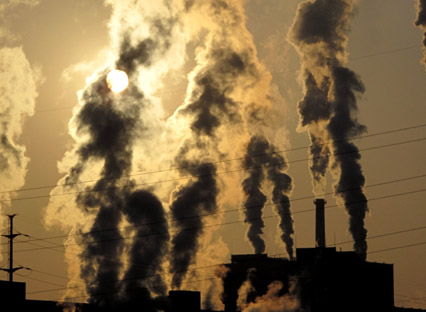‘Dad’s Army’ climate policy: what rising temperatures mean for the UK
Committee on Climate Change likens government efforts to tackle crisis to antics of hapless leaders in classic sitcom

A free daily email with the biggest news stories of the day – and the best features from TheWeek.com
You are now subscribed
Your newsletter sign-up was successful
The UK government’s “ramshackle” approach to tackling the effects of climate change poses “a real threat to the population”, experts are warning.
The latest annual progress report from the Committee on Climate Change (CCC) says that Britain is lagging far behind other countries in efforts to cut emissions and prepare for heatwaves, flash flooding and other climate-related problems, according to The Guardian.
The newly published report notes that funding for programmes to deal with these issues has been cut and that just one of the 25 emissions-cutting policies recommended by the CCC in 2018 has been delivered in full.
The Week
Escape your echo chamber. Get the facts behind the news, plus analysis from multiple perspectives.

Sign up for The Week's Free Newsletters
From our morning news briefing to a weekly Good News Newsletter, get the best of The Week delivered directly to your inbox.
From our morning news briefing to a weekly Good News Newsletter, get the best of The Week delivered directly to your inbox.
Lord Deben, who chairs the committee, said: “The whole thing is run by the Government like a Dad’s Army. We can’t possibly go on with this ramshackle system, it doesn’t begin to face the issues. It is a real threat to the population.”
So how much of a threat does climate change pose to the UK, and is it too late to take action?
What effect will climate change have on the UK?
According to climate scientists Kate Sambrook and Thomas Richardson, on a global scale “the science is settled: human emissions of greenhouse gases have already led to a rise in global temperature of more than 1°C”, leading to record-breaking heatwaves in Australia and cold snaps in the US already in 2019.
A free daily email with the biggest news stories of the day – and the best features from TheWeek.com
“In the UK meanwhile, winter temperatures soared past 20°C for the first time ever,” the University of Leeds researchers write in an article on The Conversation.
“Britain is not particularly known for intense heatwaves, vicious hurricanes or snowstorms. But, in a world that is getting warmer, climate change will mean the country experiences more and more extreme weather.”
Experts suggest that if emissions continue to increase, there is an “increased chance of milder, wetter winters and hotter, drier summers” in the UK, while the country may also see an “increase in the frequency and intensity of hot days and heavy rainfall events”.
A 2012 study for the UK Government found that extremely wet winters could become up to five times more likely over the next 100 years if climate change is left unchecked, with “more intense downpours in the winter months driving a greater risk of flash floods and river flooding, alongside risks from sea-level rise”, The Guardian reports.
“The government estimates that annual damages from flooding alone could increase to between £2bn and £12bn by the 2080s.”
The Times adds that severe heatwaves such as the one felt in Britain last summer were also twice as likely as a few decades ago, leaving a fifth of homes and buildings prone to overheating.
What measures are necessary?
According to the BBC, policies are needed to “ensure that people living in care homes, hospitals and flats can stay cool in increasingly hot summers”, while ministers “must show how funds will be found to protect critical infrastructure - like ports - from rising sea levels”.
The CCC suggests that one way of tackling the crisis would be to plant 1.5bn new trees over the next 30 years to increase woodland cover from 13 to 17 per cent in the country. This equates to planting an area of 30,000 hectares every year. But Wired reports that in the year to March 2019, only 13,400 hectares were planted in the UK.
The news site reports that wind and tidal power would also benefit the climate. However, it notes that while the UK has installed more offshore wind farms than any country, the government “recently rejected plans for what would have been the first tidal lagoon power plant in Swansea Bay”.
It also warned that “ambitious targets will not be met unless radical new policies are drawn up in the next 12 to 18 months”, Sky News reports.
But while some targets could still be met if the government acted now, the CCC reports that some goals are now impossible to achieve. In its report this week, the committee said the government's 2040 goal to eliminate emissions from cars and vans was too late.
The BBC reports that the CCC is now claiming that unless it delivered on these issues, the government would “not have the credibility to host a global climate change summit of world leaders, likely to be held in the UK next year”.
Doug Parr, from Greenpeace UK, said the CCC’s report was a “truly brutal reality check on the government’s current progress in tackling the climate emergency”, adding: “It paints the government as a sleeper who’s woken up, seen the house is on fire, raised the alarm and gone straight back to sleep.”
-
 One great cookbook: Joshua McFadden’s ‘Six Seasons of Pasta’
One great cookbook: Joshua McFadden’s ‘Six Seasons of Pasta’the week recommends The pasta you know and love. But ever so much better.
-
 Scientists are worried about amoebas
Scientists are worried about amoebasUnder the radar Small and very mighty
-
 Buddhist monks’ US walk for peace
Buddhist monks’ US walk for peaceUnder the Radar Crowds have turned out on the roads from California to Washington and ‘millions are finding hope in their journey’
-
 As temperatures rise, US incomes fall
As temperatures rise, US incomes fallUnder the radar Elevated temperatures are capable of affecting the entire economy
-
 The world is entering an ‘era of water bankruptcy’
The world is entering an ‘era of water bankruptcy’The explainer Water might soon be more valuable than gold
-
 Climate change could lead to a reptile ‘sexpocalypse’
Climate change could lead to a reptile ‘sexpocalypse’Under the radar The gender gap has hit the animal kingdom
-
 The former largest iceberg is turning blue. It’s a bad sign.
The former largest iceberg is turning blue. It’s a bad sign.Under the radar It is quickly melting away
-
 How drones detected a deadly threat to Arctic whales
How drones detected a deadly threat to Arctic whalesUnder the radar Monitoring the sea in the air
-
 ‘Jumping genes’: how polar bears are rewiring their DNA to survive the warming Arctic
‘Jumping genes’: how polar bears are rewiring their DNA to survive the warming ArcticUnder the radar The species is adapting to warmer temperatures
-
 Environment breakthroughs of 2025
Environment breakthroughs of 2025In Depth Progress was made this year on carbon dioxide tracking, food waste upcycling, sodium batteries, microplastic monitoring and green concrete
-
 Crest falling: Mount Rainier and 4 other mountains are losing height
Crest falling: Mount Rainier and 4 other mountains are losing heightUnder the radar Its peak elevation is approximately 20 feet lower than it once was